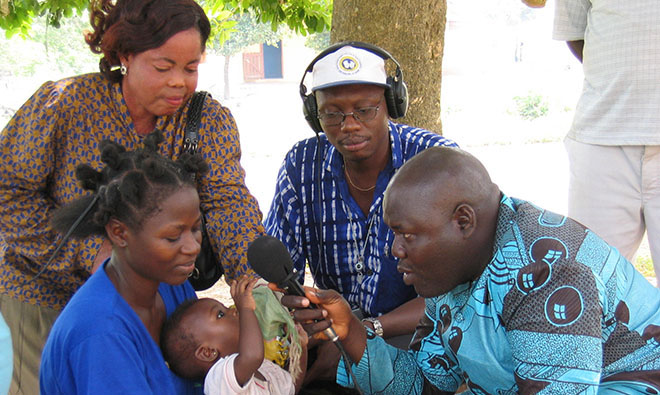
In recent years, droughts and other shocks in Africa's Sahel region have drawn attention to the urgent need to strengthen the ability of communities to cope in challenging and changing natural environments. However, despite decades of programming experience and vast literature on vulnerability and resilience in the Sahel, rates of undernutrition remain high, and nutrition emergencies reoccur on a regular basis.
Recognizing the need for comprehensive approaches to address these longstanding challenges, SPRING is partnering with Development Media International (DMI) to train community radio and theatre groups to promote maternal, infant, and young child feeding and hygiene practices in some of the hardest hit areas of Burkina Faso. This effort is in support of USAID's multisectoral Resilience and Economic Growth in the Sahel-Enhanced Resilience (REGIS-ER) project, which is focused on increasing the resilience of chronically vulnerable people, households, communities, and systems.
Employing a "saturation plus" approach, theory-based radio spots focusing on improving nutrition practices and building resilience are broadcast in local language several times a day over a sustained period of time. In addition, at least twice a week, two-hour live programs are broadcast, including 15 mintue dramas performed in local language by local actors. Existing radio listening groups also provide an opportunity to reinforce mass media messaging and interact with mothers and caregivers of young children.
SPRING's partner, DMI, is also focused on developing the capacity of the market-leading stations that have been selected to participate in the project, investing in their infrastructure and broadcast-related skills, in exchange for airtime. Broadcasts are monitored to gauge audience reactions in terms of understanding and behavior change, and feedback allows script writers to adapt messages for maximum impact.
SPRING and DMI will be conducting a radio capacity assessment to see how each of the radio's programming, nutrition, and resilience capacities have improved. In addition, qualitative research is planned near the end of phase 1 of the project to better understand the "social spread of the spots" - who is listening to the programs, who they talked to about what they’ve heard, and what topics generated the most discussion.